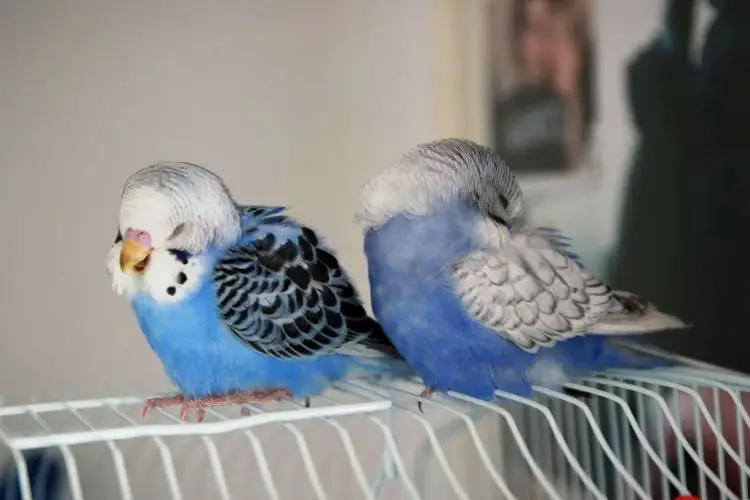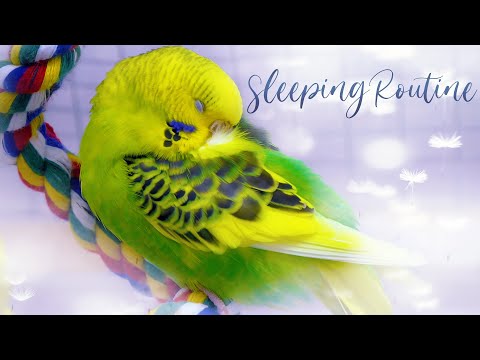Budgies, also known as parakeets, are colorful, highly social, and entertaining birds. Because they require little care and take up little space, they are ideal bird pets for beginners. Budgie sleeping positions are unusual because they try to imitate their natural sleeping positions in the wild.
So, how long and how does a budgie sleep? Budgies prefer to sleep upside down and perch on the cage’s highest point. This is how they sleep in the wild to protect themselves from predators. It may seem unusual, but it is normal. Budgies require 10-13 hours of sleep per day.
If you have more than one budgie in a cage, ensure enough space for all of them to perch. Let’s look at other positions that budgies sleep in after adapting to their surroundings.
How does a budgie sleep?
A budgie will always sleep in the highest position, regardless of comfort. Occasionally, a budgie will ascend to the top of the cage and sleep clinging to the bars, its feeder, or its swing.
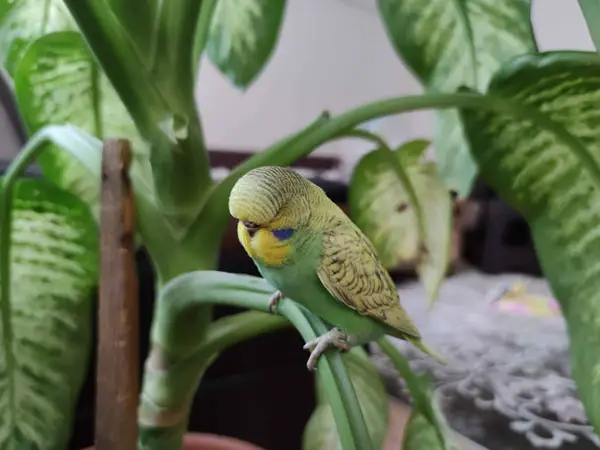
Here are various budgie sleeping positions.
1. Sleeping when upside down
The most usual position for budgies is sleeping while perching on the highest spot of the cage. This position protects them from predators in the wild, so they also maintain it in captivity.
You may ask if budgies sleeping upside down is normal, but the answer is yes. They have sturdy feet that grasp the perch and prevent them from falling off when they sleep.
Also, the parakeet brings one foot closer to its chest while sleeping, and it does this for various reasons, e.g.;
- To conserve energy by resting one foot.
- To warm up its featherless legs, budgies tuck one foot within their feathers to avoid heat loss through the featherless skin and warm the leg. They switch their legs to ensure that neither leg becomes fatigued.
- The budgie feels safer in this position; it is easier to escape danger when standing on one foot than when it has both feet tucked beneath its wings.
2. Sleeping with the head tucked in the wings
Budgies can sleep with their heads down. They will only sleep in this position if they feel safe and comfortable. When a budgie is unfamiliar with its new surroundings, it will rest on one foot.
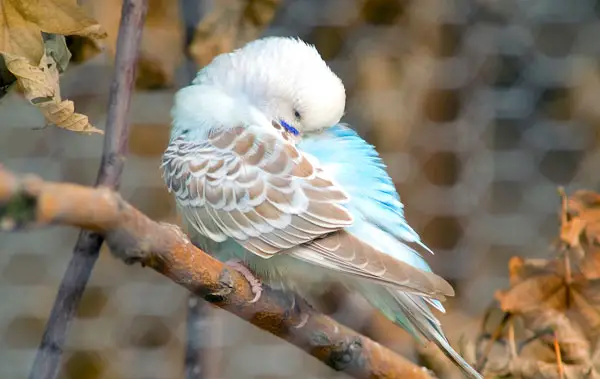
During chilly seasons, budgies sleep with their faces down to conserve heat and avoid heat loss from their featherless feet. They tuck their heads in their wings.
3. Sleeping while closing their eyes
Budgies close their eyes when they sleep when they are comfortable and feeling safe.
You may find it standing on one leg with its eyes fully shut, which means the budgie is fully asleep and comfy. Although, at times, a budgie may close its eyes but not be sleeping. It could be just resting.
4. Sleeping on the side of the cage
A parakeet may adopt this sleeping position because of the following reasons;
- It is trying to get away from a lot of light; budgies need darkness when sleeping.
- It is trying to get warm; if the heat source is nearer to the side of the cage, the budgie will perch closer to that side.
- During mating season, a female and male budgie will isolate themselves from the rest of the flock.
- If there are few perches and many budgies in a cage, some will perch near the sides of the cage.
- When trying to avoid a predator, if the budgie notices that its usual sleeping perch is nearer to a cat’s or dog’s resting place, the budgie moves to the opposite side of the cage.
- If its usual position is near noise, a parakeet will perch to the side of the cage where it is quieter when sleeping.
5. Sleeping while lying on the bottom of the cage.
A budgie will sleep lying down or on the bottom of the cage if;
- There are many budgies and no more available space to perch on.
- If the budgie feels unwell, it will sleep while lying because it does not have the energy to stand upright. However, if the budgie is healthy and happy, there is no need to worry about this sleeping position.
Also read: Do Budgies Need Sunlight?
How long does a budgie sleep
A budgie requires a maximum of 10-13 hours of sleep. They are diurnal creatures meaning they sleep at night and wake up during the day. The required 10-13 hours must not be within a continuous period.
During winter, the budgie may sleep for a few more hours because, in winter, the days are shorter than the nights. Budgies take naps during the day, which also constitute their sleeping hours.
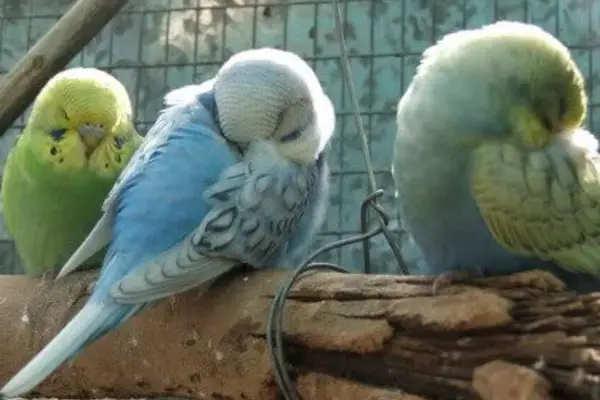
The owner should create a sleeping cycle that ensures the parakeet gets enough sleep. A well-rested budgie is not susceptible to diseases.
How to ensure the budgie sleeps well at night
You can take the following steps to help a budgie to have a good night’s sleep.
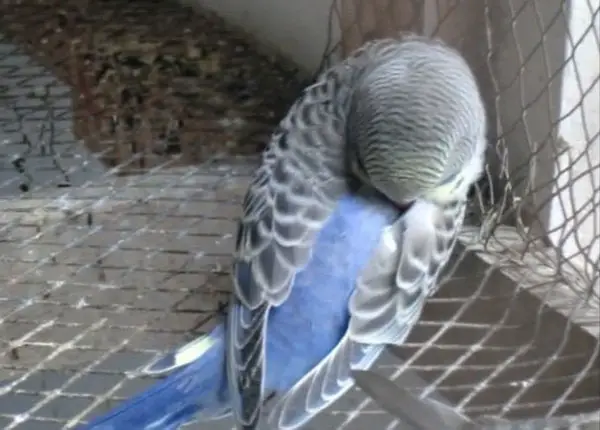
1. Place the cage in a quiet place
Like humans, budgies do not like sleeping when there is a lot of noise. Loud noise causes the budgie to be frightened, and it may fly around the cage as it tries to escape, causing danger and injuries.
2. Place the cage in an area with less light
Budgies need darkness when they sleep. So, do not place their cages near TVs or bright lights. I recommend using a cage cover to ensure the cage is dark when the budgie sleeps.
When using a cage cover, ensure it is breathable. Covering the cage makes the budgie feel safe and comfortable. Alternatively, you could move the cage to another room in the house where there is less light and noise.
3. Many perching areas in the cage
If you have more than one budgie in the cage, ensure there are plenty of perches in the cage. Plenty of perches will reduce territorial fights among the budgies, thus guaranteeing each budgie sleeps peacefully.
4. Regulating the temperature of the room.
Budgies are tropical birds. Therefore, they are used to warm temperatures. The best room temperature is 21-27 degrees celsius. It is advisable that if your budgies live outdoors, they should bring them in during cold seasons and harsh weather.
5. Maintaining the same sleeping cycle.
The owner needs to maintain a perfect sleeping cycle for the budgies. This is to ensure that the budgies get the required hours of sleep. If your birds are in an outdoor cage, they will automatically adapt to the sun’s natural timing.
How to know the budgie is not sleeping well
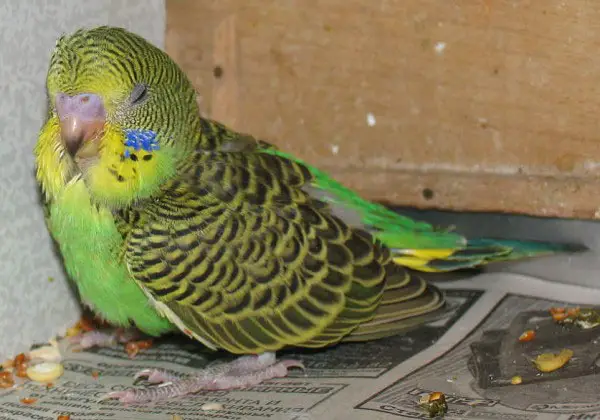
- They become cranky, aggressive, and highly squeaky when they do not get enough sleep.
- The budgie sleeps all day.
- If there are many in a cage, they may tend to fight each other often.
- Budgies tend to fall ill often if they do not get enough sleep.
- They may tug on their feathers or bite.
Do budgies need darkness to sleep
Yes, they do. Budgies are used to the sun’s cycle, so they sleep when the sunsets and wake up when the sun rises.
You should cover the budgies’ cage to reduce light. The budgies may be a little uncomfortable when you start covering their cages, so leave a small space for a bit of light to get in, so they slowly become acquainted with the darkness.
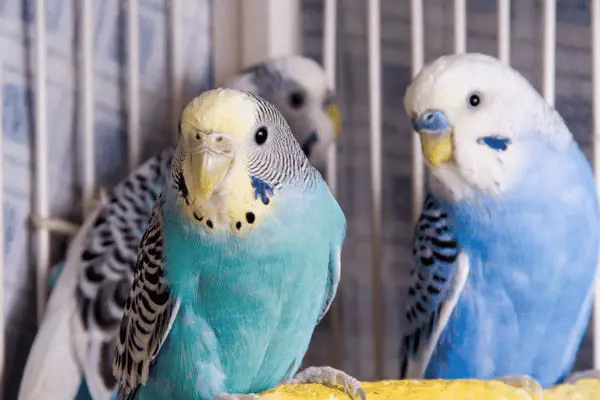
You could also use a night lamp to imitate the light from the moon and stars. When switching off the lights, switch one at a time to not startle the budgies.
Do budgies sleep during the day
Yes, budgies sleep during the day; these little feathered pets like taking naps that do not last more than 15 minutes during the day. They mostly nap during the warm seasons.
However, you should observe whether it is a prolonged nap which usually means that the budgie is not getting enough sleep or is sick.
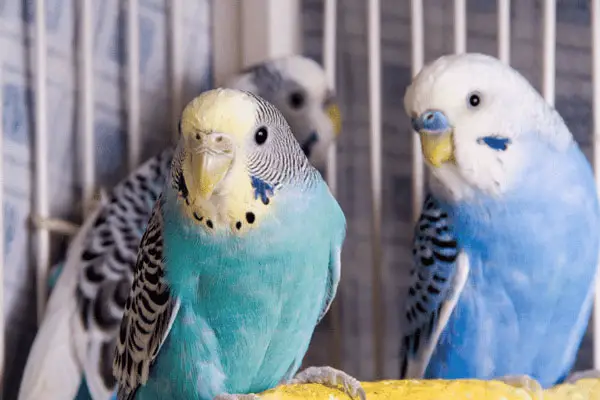
Do budgies sleep with noise?
Budgies dislike noisy areas while they are sleeping. Therefore, you should ensure their cages are in a noise-free area so that the budgies will be able to sleep peacefully.
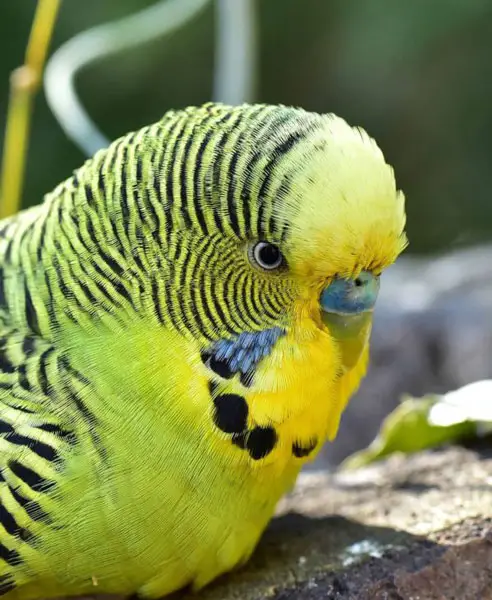
Loud noise may startle the parakeets and lead to fright, making the budgies rowdy and flying around within the cage, which could lead to injuries.
Video of how a budgie sleeps.
Here is a video to help you understand further how budgies sleep.
Related: Do Budgies Need Sunlight?
Related Questions
Here are some other questions related to how budgies sleep.
You should put your budgie to sleep a little after 7 pm. This will make the budgie’s sleeping cycle in tune with the natural sun cycle. Maintain a sleeping schedule for your parakeet to ensure it gets the needed hours of sleep.
In normal circumstances, a budgie should not sleep with its eyes open. Like any other creature, budgies require to shut their eyes when sleeping. If your budgie is sleeping with one eye open, it is because it is still yet to be acquainted with its surroundings.
However, some budgies sleep with their eyes slightly open which is perfectly normal. That is just their preference.
Budgies can puff up during sleep to keep their bodies warm. This makes the bird feel better and aids in excellent sleep. They also tend to puff up when attracting mates. However, if the budgie stays puffed up and its feathers seem lethargic, it is time to call a vet.
Conclusion
Budgies have various sleeping positions, which are sometimes unusual, but they should not make you worry. However, ensure your budgie(s) get enough sleep by maintaining a warm room temperature, ensuring less noise and light, and keeping their cages clean.
As a budgie owner, pay attention to any signs of distress that the budgie may face and try to make the little fellas’ life easier. Work out a sleeping schedule that ensures the budgie gets enough hours of sleep. I hope you now know all about budgies sleeping positions.
